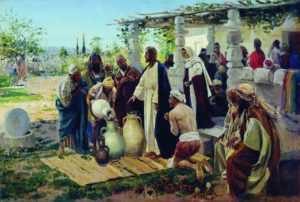Jn 2:1-11
There was a wedding at Cana in Galilee,
and the mother of Jesus was there.
Jesus and his disciples were also invited to the wedding.
When the wine ran short,
the mother of Jesus said to him,
“They have no wine.”
And Jesus said to her,
“Woman, how does your concern affect me?
My hour has not yet come.”
His mother said to the servers,
“Do whatever he tells you.”
Now there were six stone water jars there for Jewish ceremonial washings,
each holding twenty to thirty gallons.
Jesus told them,
“Fill the jars with water.”
So they filled them to the brim.
Then he told them,
“Draw some out now and take it to the headwaiter.”
So they took it.
And when the headwaiter tasted the water that had become wine,
without knowing where it came from
— although the servers who had drawn the water knew —,
the headwaiter called the bridegroom and said to him,
“Everyone serves good wine first,
and then when people have drunk freely, an inferior one;
but you have kept the good wine until now.”
Jesus did this as the beginning of his signs at Cana in Galilee
and so revealed his glory,
and his disciples began to believe in him.
Bishop Barron:
Friends, in today’s Gospel, we read about the wedding at Cana. Jesus’ mother is the first to speak, as John tells the story: “They have no wine.” On the surface level, she is indeed commenting on a social disaster— running out of wine at a party—and she is asking Jesus to do something to make things better.
But let’s go deeper. Wine, in the Scriptures, is a symbol of the exuberance and intoxication of the divine life. When God is in us, we are lifted up, rendered joyful, transfigured. Therefore, when Mary says, “They have no wine,” she is speaking of all of Israel and indeed all of the human race. They have run out of the exuberance and joyfulness that comes from union with God.
And this is precisely why Jesus calls her “woman.” We can be easily misled into thinking that he was being curt or disrespectful. But he was addressing her with the title of Eve, the mother of all the living. Mary is the representative here of suffering humanity, complaining to God that the joy of life has run out.


Recent Comments